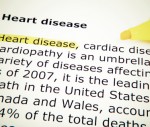 Your heart undergoes plenty of stress during the holidays, increasing your risk of Christmas heart attack and holiday heart syndrome. December 26th, in particular, is a dangerous day for those suffering from heart-related problems, so these individuals become more vulnerable to heart attacks, arrhythmias and heart failure.
Your heart undergoes plenty of stress during the holidays, increasing your risk of Christmas heart attack and holiday heart syndrome. December 26th, in particular, is a dangerous day for those suffering from heart-related problems, so these individuals become more vulnerable to heart attacks, arrhythmias and heart failure.
Previous research suggested that the risk of heart-related deaths increases five percent during and post-holidays. Researchers explained that this increase may be due to patients delaying treatment for their heart or that staffing in hospitals changes during this season. Emergency room doctors report that although Christmas day is quiet for cardiac events, come December 26th, heart-related problems surge in ERs. An alternative study found that cardiac-related traffic in hospitals increases 33 percent during the four days after Christmas.
What is holiday heart syndrome?
Advertisement
The term “holiday heart syndrome” refers to a heart rhythm disorder known as atrial fibrillation that can occur due to increased alcohol consumption, a common temptation during the holiday season. The effect alcohol has on the heart has been well documented, however, most research has focused more on the beneficial effects of moderate use or the long-term effect of chronic alcoholism, rather than the negative consequences it can cause when consumed in excess in a short period of time, or during binge drinking sessions.
It is believed that holiday heart syndrome is, in fact, a result of many factors that go beyond simply drinking alcohol, as the over-consumption of fatty meals, increased sodium, combined with the stress that the holidays tend to bring may all be contributing factors to this form of arrhythmia.
Is holiday heart syndrome common?
It remains unclear which cardiac arrhythmias can be attributed to alcohol use, but one study showed that 35 percent of cases of new-onset atrial fibrillation were linked to alcohol use. Of those, 63 percent of cases showed up in patients younger than 65. However, another study found only about 5 to 10 percent of new episodes of atrial fibrillation can be explained by alcohol use.
While there no definitive race, sex, or age-related demographics in relation to the presentation of holiday heart syndrome, it can be inferred that males have a higher incidence as they have a higher incidence of atrial fibrillation and alcoholism.
Holiday risk factors that can harm your heart
 Why do the holidays place such a burden on your heart? Well, for starters the winter time brings with it colder temperatures, which reduces circulations and makes your heart work harder. Furthermore, your routine undergoes many changes during the holidays, such as staying up later, consuming more foods – many of which are not heart-healthy – not exercising as much, and a massive to-do list to complete in a short amount of time.
Why do the holidays place such a burden on your heart? Well, for starters the winter time brings with it colder temperatures, which reduces circulations and makes your heart work harder. Furthermore, your routine undergoes many changes during the holidays, such as staying up later, consuming more foods – many of which are not heart-healthy – not exercising as much, and a massive to-do list to complete in a short amount of time.
The holidays can also be a stressful time; from endless hours of shopping, to preparing the home, to simply running around visiting everyone on short notice. Stress can negatively impact the heart and the body as a whole, and although it’s important to reduce it all-year round, it is more important to reduce stress during the holiday season – especially if you already have a heart condition.
Lastly, alcohol seems to be a large focus when it comes to the holidays. Binge drinking has been linked with atrial fibrillation – irregular heart beat – which may be harmless to many, but can increase the risk of heart complications if you already have heart problems, such as high blood pressure.
These factors can all contribute to an increased risk of heart failure and heart attack during the holidays.
Holiday heart syndrome symptoms
The most common symptoms of holiday heart syndrome include:
- Palpitations (heart pounding)
- Breathlessness with physical activity
- Cardiac chest pain (angina) that may be confused with heartburn
- Dizziness
- Fatigue
- Fainting spells
- Irregular or thready pulse
Holiday heart syndrome and alcohol consumption
 It is important to focus on alcohol and the holidays because people may develop what is known as holiday heart syndrome. Dr. Philip Ettinger first coined the term holiday heart syndrome to describe the condition related to excessive drinking and food consumption during the holidays and its impact on the heart.
It is important to focus on alcohol and the holidays because people may develop what is known as holiday heart syndrome. Dr. Philip Ettinger first coined the term holiday heart syndrome to describe the condition related to excessive drinking and food consumption during the holidays and its impact on the heart.
Holiday heart syndrome is the dysfunction of the conductive system of the heart, along with irregular heartbeat due to alcohol. This arises in people with no previous history of heart disease. On one hand, the condition is reversible and can be well treated as long as a person abstains from drinking alcohol, on the other hand, it can be threatening to people with known heart problems. Additionally, holiday heart syndrome is commonly seen in individuals who have a history of excessive alcohol consumption all-year round, which raises harmful risks even more so.
It’s unclear what the prevalence of holiday heart syndrome is as it resolves itself once alcohol consumption is reduced or stopped. Some studies suggest that 35 percent of patients with atrial fibrillation are linked with holiday heart syndrome.
It is also unclear as to why alcohol causes the heart to beat irregularly, but some believe it has something to do with how alcohol affects electrolyte levels, increases the stimulatory activity of the nervous supply to the heart, increases fat in the bloodstream, alters the blood pH or directly irritates the heart muscle.
Tips to keep your heart health during Christmas
Advertisement
Whether you have a history of heart problems or not, it’s important to keep your heart in mind during Christmas and practice safety measures to keep it healthy right into the New Year. Here are some tips that can help protect your heart this holiday season.
 Help those less fortunate than you; being generous has been found to improve the heart.
Help those less fortunate than you; being generous has been found to improve the heart.- Take the time to exercise, but don’t over-exert yourself. Exercise can improve mood and be a form of relaxation.
- Manage and reduce stress and schedule time to relax.
- Get the flu shot to protect yourself from illness.
- Set goals for yourself come the New Year to get healthy.
- Try to maintain healthy eating habits – stock up on fruits and vegetables and don’t over-do the desserts.
- Get proper sleep and try and maintain a sleep schedule.
- Make plans and goals prior to shopping so holiday shopping doesn’t become overwhelming and add stress –shop online to avoid lineups.
- Alternate alcoholic beverages with water and always stay hydrated throughout the holidays, even if you’re not consuming alcohol.
- Stay social – being isolated or feeling alone can hurt your heart.
- Keep realistic expectations; high ones can not only set you up to fail, but can add stress.
- Keep up with your medication routine and go see your doctor regularly – skipping out on treatment and preventative care can have harmful effects.
By following these tips you can have greater success in keeping your heart and your body healthy during the holidays, while still enjoying yourself and your loved ones.
Related: Simple tips to reduce stress this holiday season
